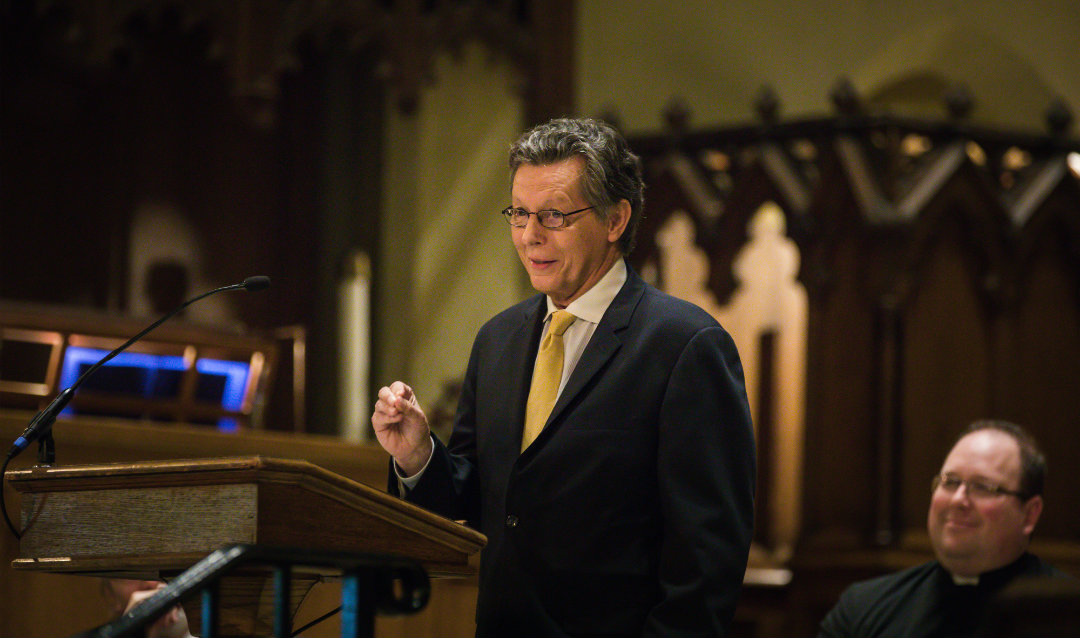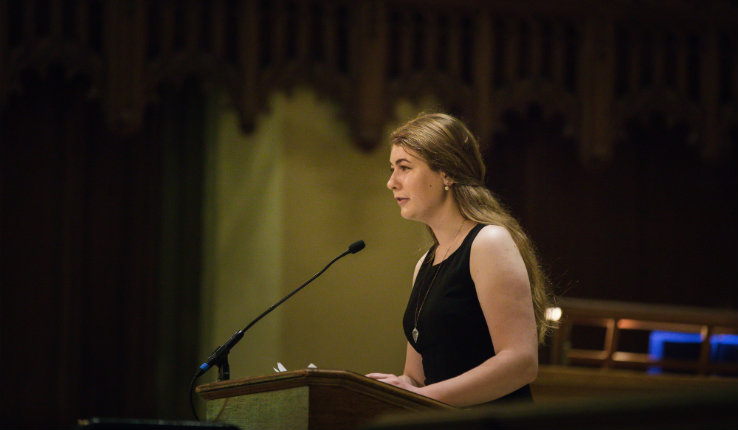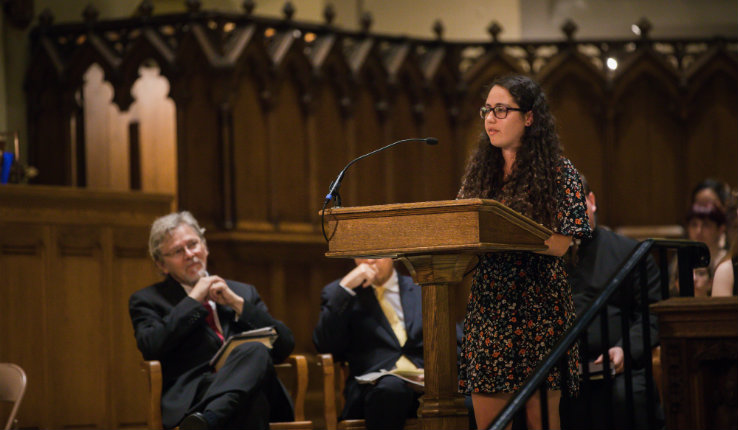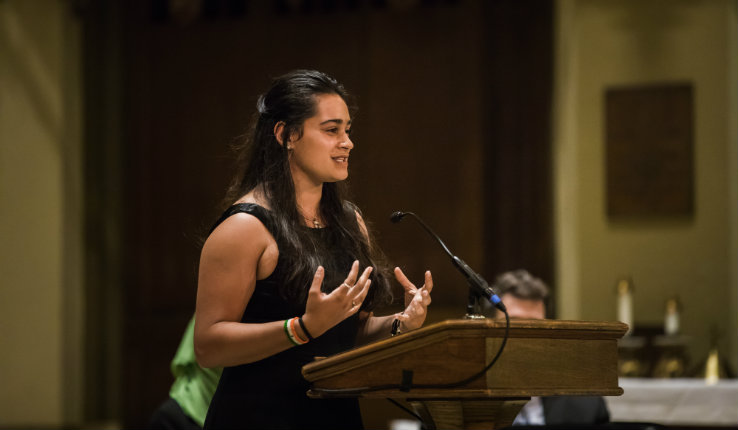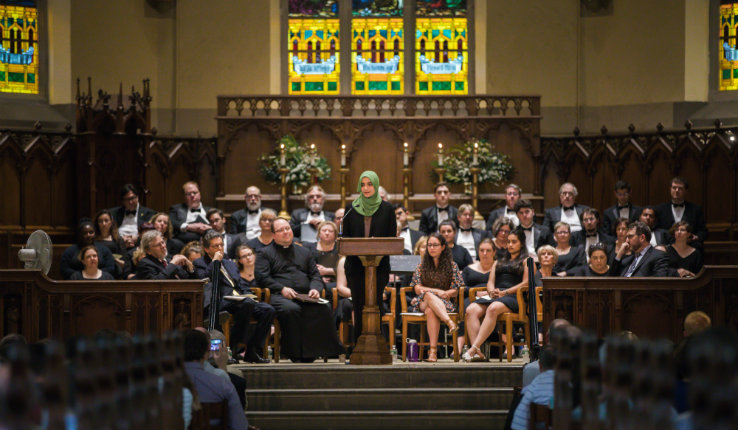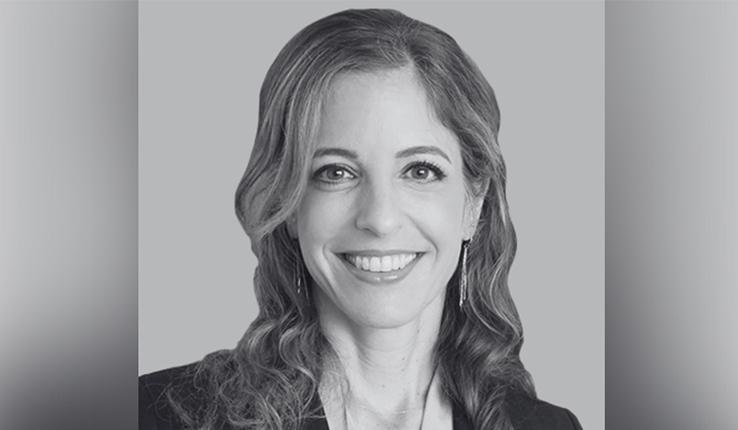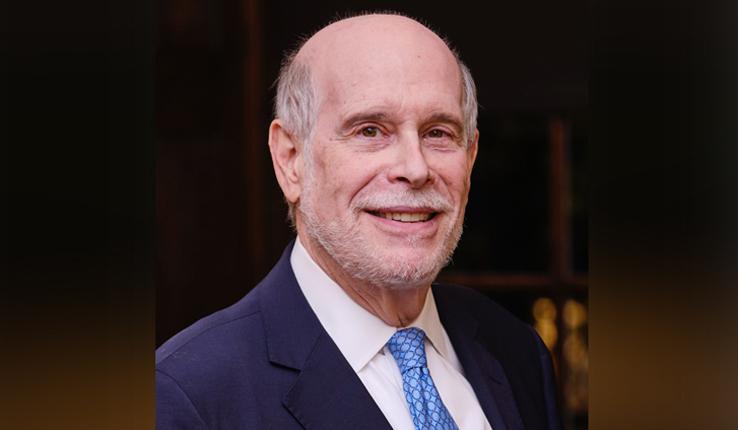The best pastors, he said, have that knack to find the key issues in a person’s life. His wife Brenda, a Lehigh graduate, was one before she lost her 10-year fight with cancer, he said. Sometimes there is a word that people need to hear, even if they try to change the subject, like the woman did when Jesus identified an issue in her life.
Jesus in that story said it didn’t matter where the woman worshiped, just that she did. What mattered was the woman, her spirit and the truth, Dorrien said. Dorrien also mentioned the capacity to care for others and sharing the world with others.
“In desert societies, water is so precious that it is money,” Dorrien said. “People fight and die for it. Marriages were arranged to secure it. Empires rise and fall [over it]. Entire societies stretched over several millenniums have taken for granted that fighting over water is ingrained in human nature. Many such deserts still exist, deeply conditioning the human beings that live within them. Yet, we do not fret of dying of thirst.”
In society, he said, water is shared, but there could be more advancements.
“Imagine societies in which everybody has food, shelter, health care, education and a chance to know their value,” Dorrien said. “And if we move that way, we might not have to retrogress over fighting over water.”
A Spiritual Tradition
As Steffen welcomed attendees, he explained the origins of the Baccalaureate service, noting the first was held in 1432 at Oxford University and was intended as a final exam. Perspective graduates had to deliver a sermon showing their mastery of religious communication in Latin before faculty.
Instead of an exam, today most universities honor the religious heritage of Baccalaureate by holding “interfaith religious services that honor the spiritual traditions of the community.” In addition to a farewell address in their honor, graduating students heard from four students from various faiths, who shared something of meaning for them. The four students, introduced by Rabbi Steven Nathan, director of Jewish student life and associate chaplain, were:
- Sarah Stankus ’19 (Christianity), who graduates with a dual degree: a bachelor of science in earth and environmental science and a bachelor of arts in English. Stankus said she was raised in a Christian household but didn’t fully understand until college what following Christ was all about. The deciding factor in attending Lehigh as a freshman, she said, was the Christian fellowships on campus, which she said helped her when she felt lost that first year. “After that year I continually understand who Jesus is and what Christianity is all about. It’s about love, plain and simple.”
- Emily Weston ’19 (Judaism), who graduates with concentrations in computer science and history and a minor in science, technology and history. “The Jewish community has been one of the most significant parts of my life at Lehigh,” she said, adding that her experiences helped her become more independent because she knew even as she branched out in other areas of her life, she would always be a part of the Jewish community. That has also helped her do something she never would have considered four years ago: become part of a Jewish community in Philadelphia after graduation, she said.
- Nayantara Chasson ’19 (Indian Traditions), who graduates with a major in electrical engineering and a minor in German, told a story of her father moving to America, abandoning his Indian roots and her parents raising both her and her brother on tolerance, understanding and a variety of perspectives. Because of that, she said, however, she thought she was missing a piece of her background. At Lehigh, she joined the South Asian Students Association when group members reached out to her, and while she was going through a tough time as a transfer student, she realized how welcoming Indian culture is. At Lehigh, she said she was able to celebrate Indian holidays such as Holi. “I watched as this holiday, a product of my culture, united a campus that has so many different perspectives and backgrounds,” Chasson said. “And I was just filled with pride over the fact that I was blessed to have been born into this culture, and I’m grateful to Lehigh for allowing me to explore it.”
- Maryam Khan ’19 (Islam), who graduates with a major in bioengineering and minors in both computer science and economics, said she saw a lot of people from different faiths and backgrounds in attendance. They came together to celebrate those graduating and their hard work pursing an education. She shared how important that is, stating the first words that are revealed to the Prophet Muhammad were to read in the name of the Lord. “It wasn’t to pray, it wasn’t to give charity, it wasn’t to fast, it wasn’t to go on pilgrimage but it was to go out and seek effort in acquiring knowledge.” Khan wondered as a child why that was, but now realizes the impact education can have. “Education breeds tolerance,” she said. “It’s the reason why we believe that we should peacefully coexist with everyone, respect each other, despite our differences. In a world filled with hate, education teaches us the importance of understanding differences and respecting different perspectives.”


